Are you intrigued by the tech startup realm but lack a technical background? Fear not, as creating a tech startup as a non-technical person is entirely achievable. You don't need to be a videographer to have a great idea for a TV show. Being a non-programmer should not hinder your success in the tech industry.
But what do you do step-by-step to start a tech company? Develop a tech product with a validated idea. Test it with an early product version, secure funding, promote your startup, and focus on continuous improvement and scalability. It is also essential to make cash forecasts to raise funds and find willing investors.
This article seeks to address the aspirations of a non-technical individual aspiring to create a tech startup. At Codica, we are proud of our vast experience in building startups and are ready to share valuable tips with you. Let's explore all the vital factors you should consider to make your tech venture a reality!
Startup and established business: the major difference
Before we dive into our main topic of how to start a tech startup company, let’s discover what is unique about startups. A startup and a business have distinct characteristics that set them apart. Both aim to provide products or services to customers and generate revenue. However, their approaches, growth trajectories, and objectives can differ significantly.
In general, startups are experimental and innovative. In turn, existing businesses' processes are based on trial and insights received from user feedback. We will talk about this in more detail later.
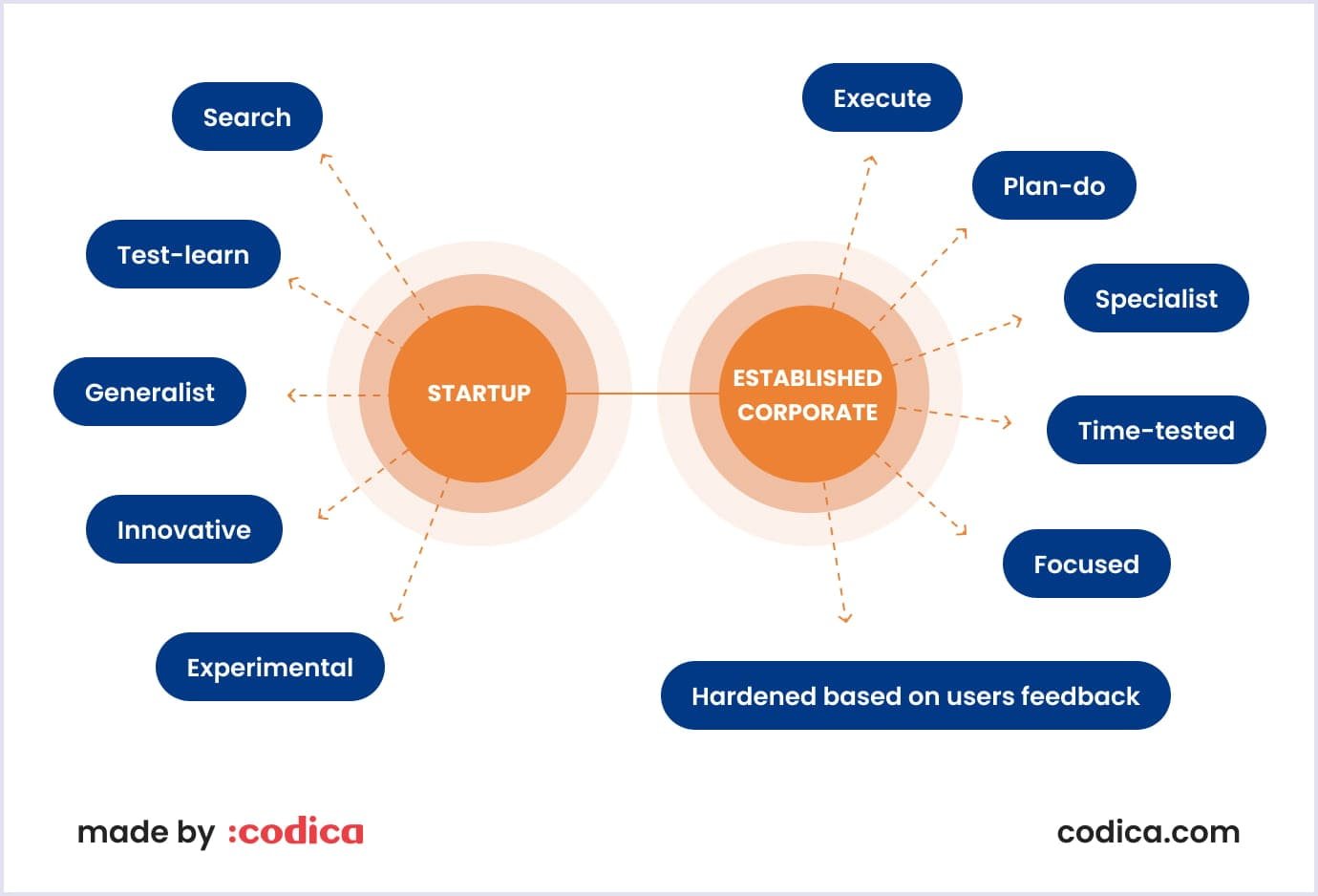
Here are some core factors that make a startup unique as a business.
Age of companies
According to the U.S. Bureau of Labor Statistics, about 20% of new businesses fail within the first two years. Approximately 45% fail within the first five years. This highlights the higher risk and uncertainty associated with startups.
On the other hand, established businesses with a longer track record tend to have a higher survival rate over time.
Innovation and disruption
Startups are often associated with innovation and disruptive ideas. They typically introduce new products, services, or technologies to the market. They aim to solve a specific problem or meet a unique need. On the other hand, businesses, especially established ones, may focus on maintaining existing products or services. Then, ventures should improve their market position.
Industry and sector
Startups are more likely to be found in emerging and high-growth sectors. These include technology, biotech, and fintech, where disruptive innovation is prevalent. Existing businesses may dominate traditional industries and sectors with more stable growth patterns.

Source: statista.com
Culture and mindset
Startups typically promote a culture of innovation, experimentation, and risk-taking. They often have a "fail fast, learn fast" mindset, where learning from mistakes is valued. Established businesses may have a more conservative and risk-averse culture. They focus on stability and optimizing existing processes.
Growth rate
Startups are known for their rapid growth rates. High-growth startups are known as "gazelles." A gazelle successful tech company means that each year, for at least four years, the business's revenue grows by 20 percent.
Gazelle startups make up only a small percentage of all new enterprises. But they contribute significantly to job creation and economic growth. Established businesses, while still growing, may have more moderate growth rates. This is due to their mature operations and market competition.
Funding and investment
Often, a tech startup relies on external funding to drive its growth. According to data from Statista, venture capital investment in startups reached $157 billion globally in the U.S.
By the way, running out of cash is the most common reason startups fail. So, a successful startup significantly depends on funding from investors.
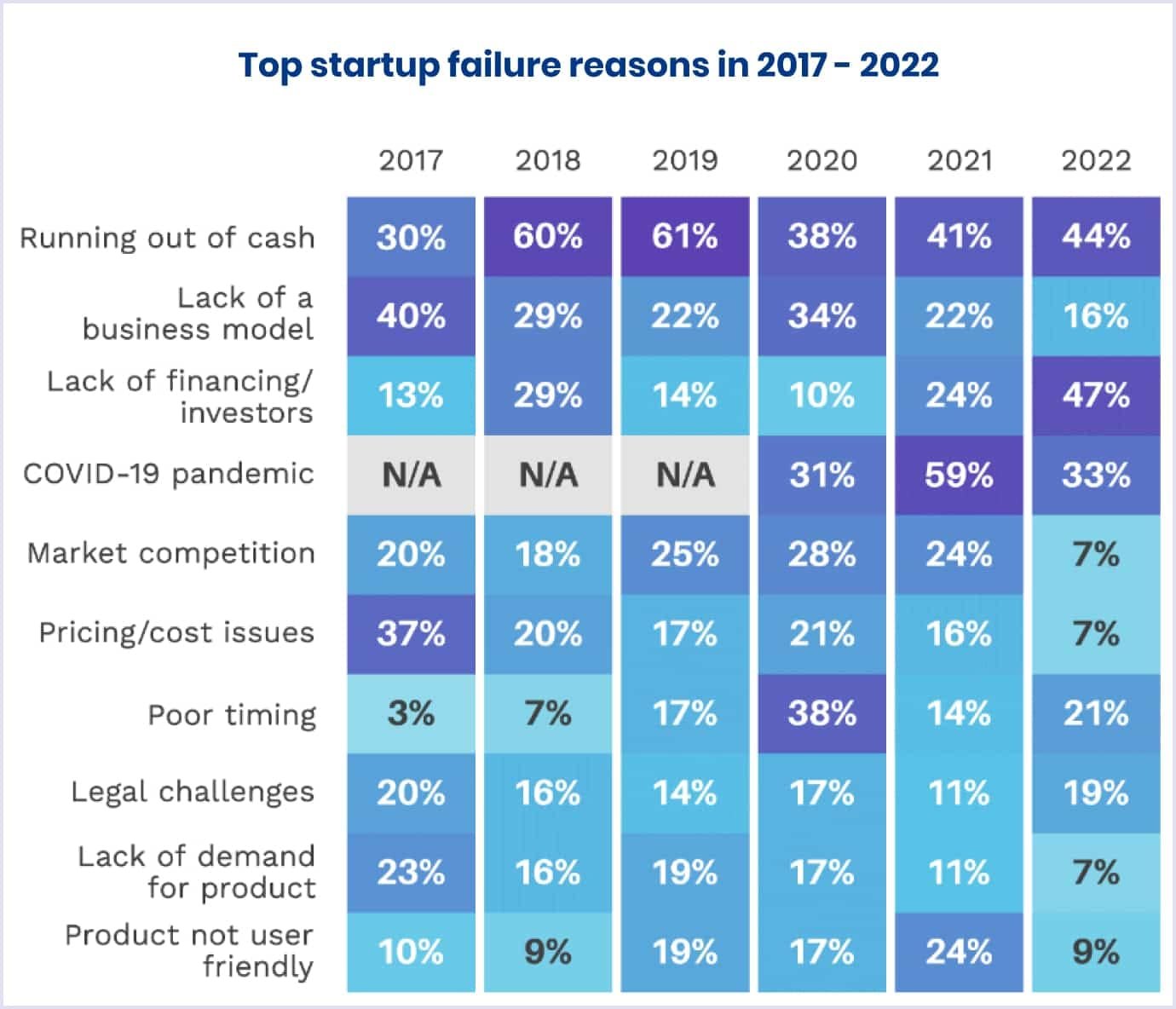
Source: skynova.com
Established businesses can have access to various sources of financing. However, they rely less on venture capital and more on revenue and profits to fund their operations.
It's vital to note that these statistics present a general overview, and individual cases may vary. Tech startups and established businesses have their own unique strengths and contributions to the economy. Most startups drive innovation and create new opportunities. In turn, established businesses provide stability. They also play a crucial role in sustaining economic activity.
Checklist for starting a tech company
Let's acknowledge that crafting a checklist of nine steps is somewhat arbitrary. The number could have been anywhere between 9 and 20, but the essence lies in building the right mindset. Various recommendations emphasize the importance of mindset over following a rigid checklist. For instance, in "The Lean Startup" by Eric Ries, the path is outlined in three steps:
- Vision: Define your startup and experiment with it.
- Steer: Test your product/service and pivot as needed.
- Accelerate: Focus on growth and scaling.
The crucial aspect is not how you build your mindset but rather that you cultivate one that maximizes your odds of success. With that in mind, here are our suggested steps to pave your way.
Cultivate a strong network
Recognize that success when you decide to start a tech company with no experience requires collaboration. Build a diverse and robust network of individuals with varied skills and expertise. Forge connections with potential co-founders, investors, designers, and professionals within your industry. You can engage actively in networking events and online forums.
Capitalizing on your network, identify co-founders and team members who share your overarching vision. Building an expert team that complements your needs is crucial for a well-rounded tech business.
Read also: Top 11 Effective Partner Engagement Strategies for Business Owners
Define your startup's identity
Conduct thorough research to comprehend your target market and industry trends. Identify specific needs and pressure points that your company can address effectively. Analyze competitors and potential oversaturation in the market. Clarify your startup's unique value proposition and mission. Ensure that every aspect of your venture, from its name to its culture, reflects this identity.
At Codica, we recommend you conduct a product discovery. At these sessions, we will thoroughly analyze your idea and decide on the best way to implement it. With Codica, you can easily start a tech company without tech background. The key reasons to hold product discovery sessions are the following:
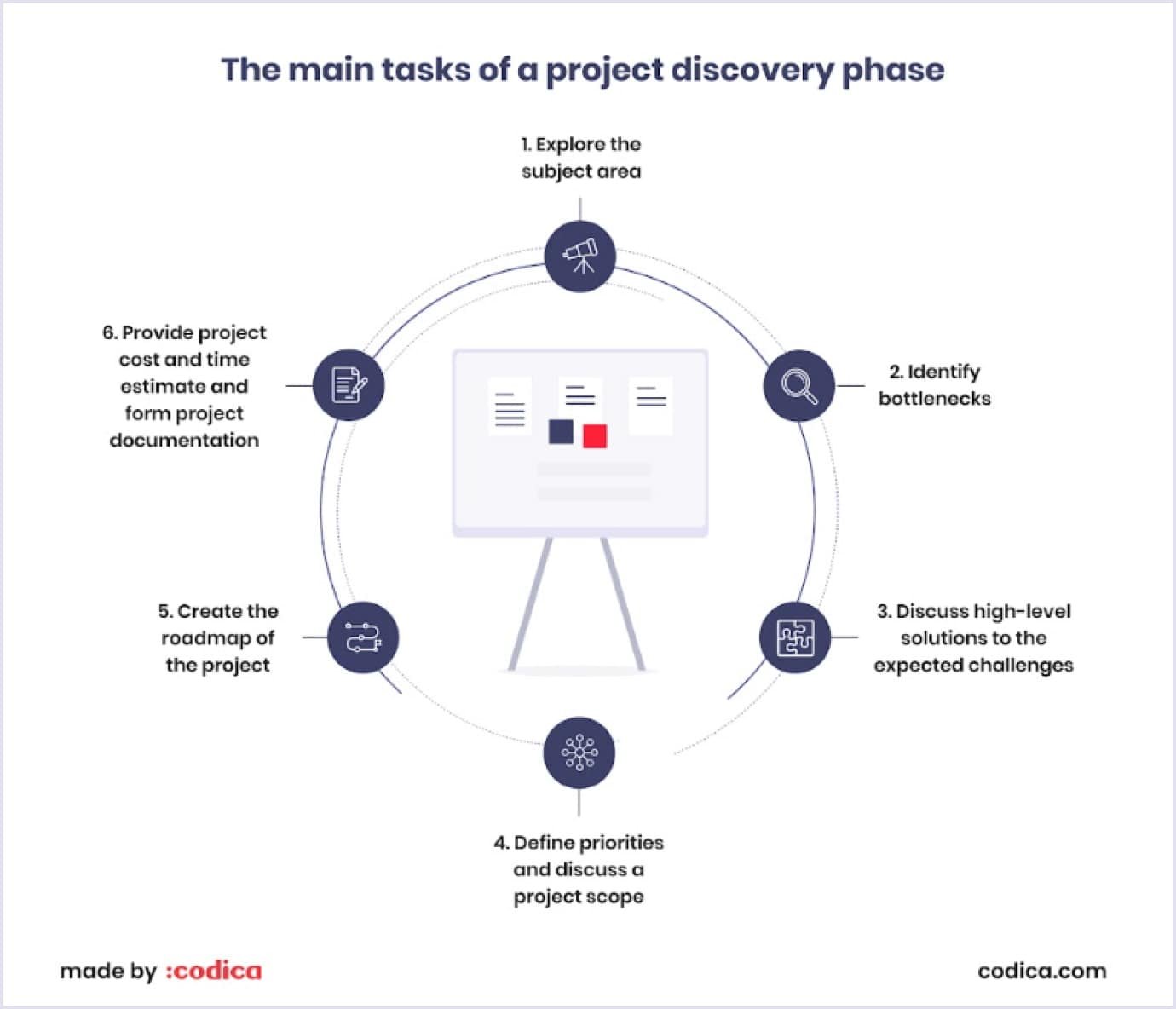
Validate your MVP
The minimum viable product (MVP) is a project version with core functionality. It is advisable to craft an MVP to collect user feedback and solve people’s specific problems.
Our team provides quality MVP development services. We ensure the MVP resonates with the market and effectively addresses identified needs. When the product has confirmed its value for the target audience, we add other features to our clients’ requests.
For example, one of the MVPs we delivered was for the fitness app project. It is a progressive web app called Impact. The solution empowers clients to pursue personalized fitness programs curated by their trainers. Here is a short video of how Impact operates now.
Coming from a gym environment, the founder of Impact had no previous tech expertise. He was satisfied with the communication with us and the results obtained. We kept him up to date with all processes and explained all the aspects of PWA development.
Below, you can see the review our client sent about our mutual cooperation.
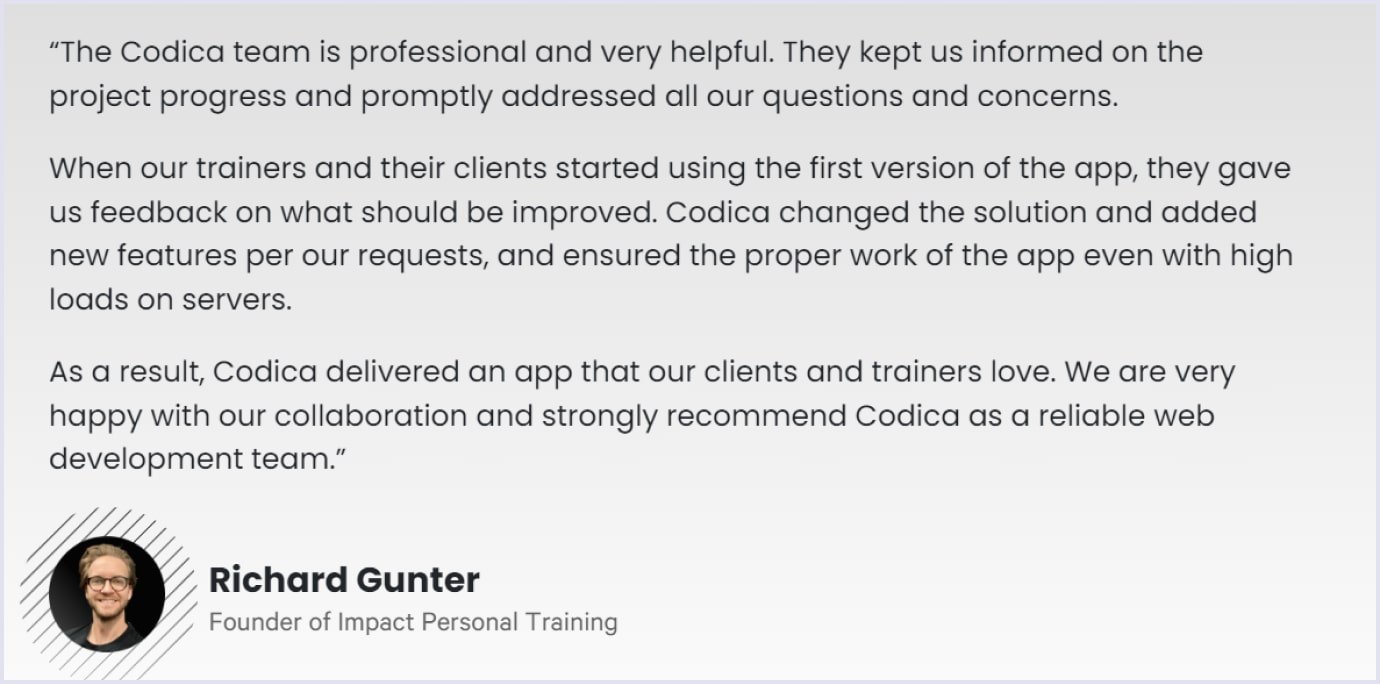
The MVP app development practice relates to the approach we apply at Codica, the lean startup methodology.
The core of the lean startup methodology lies in gathering data on MVP performance and continuously learning from real-world customer feedback. We use this approach as it enhances the product and minimizes inefficiencies.
You may also like: How to Create a Minimum Viable Product (MVP)
Secure funding
Develop a compelling pitch to attract potential investors or venture capitalists. Consider cash forecasting to manage financial resources effectively and predict funding needs.
Market validation is essential to demonstrating that your product or service has demand in the market. Present evidence of market validation. These are first customers, letters of intent from potential clients, or strategic partnerships. Demonstrating traction and progress is vital to instilling confidence in angel investors. So they will be more certain about your startup's potential for success.
Cash forecasting
It is a critical financial practice for successful startup development. This allows you to manage your startup's financial resources effectively. Through the creation of a comprehensive financial projection, you can anticipate your monetary inflows and outflows over a defined timeframe. Typically, it is a monthly or quarterly cadence.
The forecast helps you anticipate times when your cash outflows may exceed inflows. This enables you to raise funds or implement cost-cutting measures when necessary.
Identifying potential funding gaps early on is crucial to avoiding financial crises. By understanding your funding needs in advance, you can explore diverse funding options. These are things such as equity investment, debt financing, or government grants.
Prepare for effective management
As your venture progresses and expands, adept management plays a crucial role in upholding efficiency and productivity. To steer clear of confusion and optimize operations, institute well-defined workflows and delineate responsibilities within your team.
Consider hiring or delegating management responsibilities to capable leaders. Empower them to take ownership of specific areas. This will help you focus on strategic decision-making and the right direction. A positive work culture and open communication within the team will encourage collaboration and enhance overall productivity.
Implement accountability measures by setting performance metrics and conducting regular check-ins to track progress and ensure everyone remains on track.
You may also like: 15 Burning Web Development Trends to Follow in 2023
Promote your startup
Effective marketing strategies are essential to raising awareness about your startup in a competitive tech industry.
To embark on your journey, begin by pinpointing your specific target group and customizing your marketing strategies to resonate with them on a more profound level. Utilize the power of content marketing to craft compelling and valuable materials. They will not only showcase your expertise but also educate potential customers about the uniqueness of your company.
Unleash the power and potential offered by a diverse array of social media platforms. Thus, you will establish a robust online presence. Also, you will directly interact with your audience, forging genuine connections.
Additionally, consider collaborating with influential figures within your industry. So, you will extend your reach to a broader spectrum of potential customers.
Remember that startup software development is an iterative process. Success often requires a combination of creativity, adaptability, and strategic planning. Continuously learn from your experiences and seek feedback from mentors and advisors. Thus, you will refine your strategies and increase your chances of success.
By the way, we recommend you watch a video of Codica’s chief marketing officer, Maria. There, she shares helpful tips for an excellent content marketing strategy. Using them, you can successfully promote your solution.
Plan for scalability
Consider how your startup can handle growth and increased demand in the future. This involves more than just having a product or service that can scale. You should ensure your infrastructure and team are equipped to handle the expansion. Anticipate potential challenges that come with growth, such as increased customer support needs or supply chain management. This will help you prepare effectively.
Embrace opportunities
Stay flexible and be open to seizing unexpected opportunities that arise. It's crucial to stay open-minded and flexible as a startup founder. Embrace the idea that unexpected opportunities may come your way, and be ready to adapt your business strategy to seize them. Chance events can significantly impact the trajectory of your company. They can also cause an early buzz with your target group.
For example, these events can be a chance encounter with a potential investor or an unexpected partnership opportunity.
Being agile and open to change will accelerate your business’s growth. Embracing opportunities also means pivoting if existing market conditions or customer demands shift. This will allow you to stay relevant and competitive in the ever-changing business landscape.
Best practices for starting a tech company
You have gained an understanding of the essential requirements for launching a company. So, let’s delve into a collection of best practices and principles of startup creation. They will offer valuable insights into starting a tech business successfully.
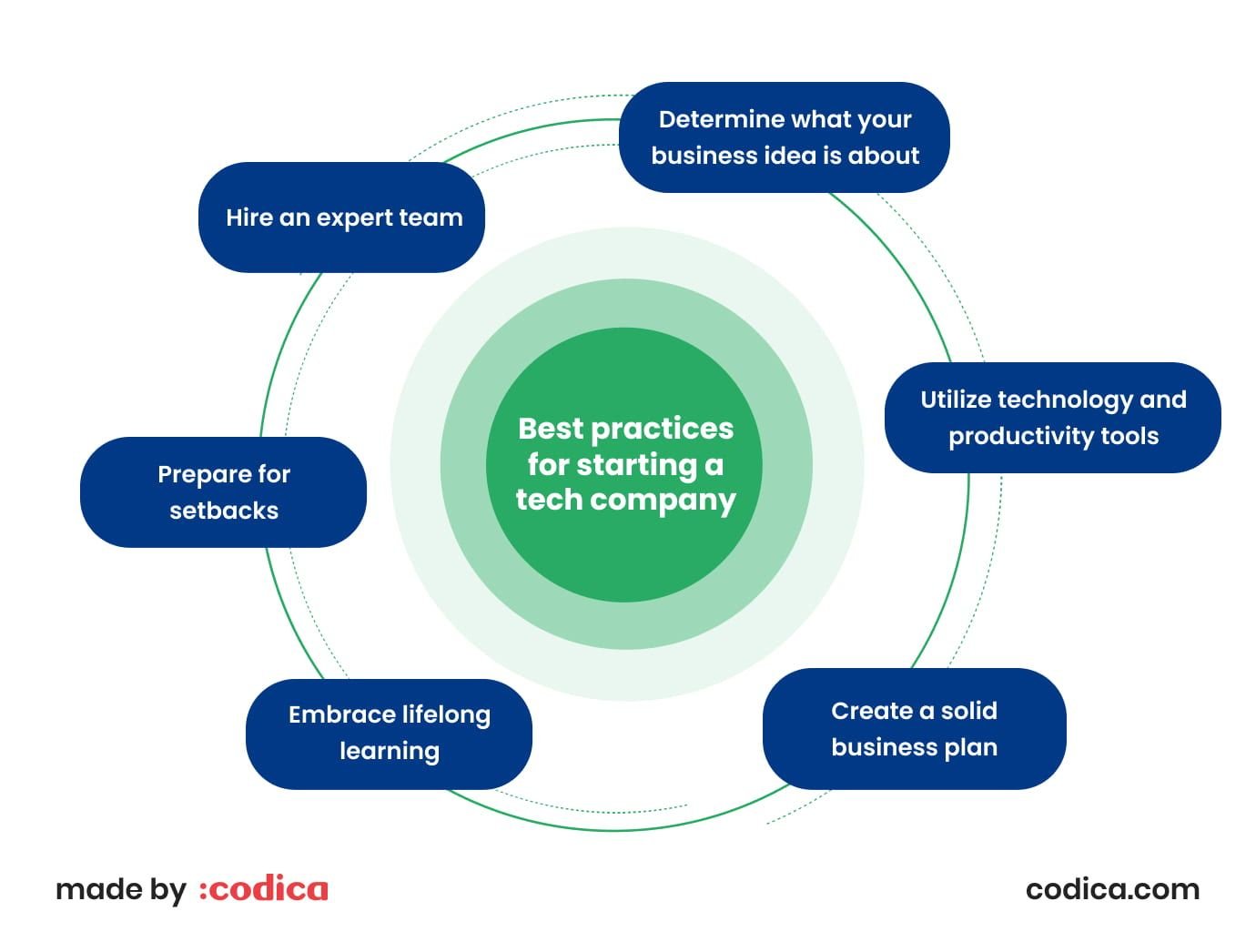
Determine what your business idea is about
Above all, it is paramount to recognize the clear demarcation between a "tech startup" and a "traditional business." A tech startup sets itself apart by harnessing technology to tackle challenges remarkably innovatively. The essence lies in providing a product or service that goes beyond the ordinary. It offers distinctive solutions that are not presently accessible on the market.
To achieve success, it is paramount to possess a profound understanding of the problem you aim to solve and the market you intend to enter. Thorough research about the market landscape and your potential customer base is essential. Collecting feedback from potential customers or users can serve as a valuable tool to discern how your tech startup can make a significant impact.
Utilize technology and productivity tools
Within the tech industry, a prominent movement is evident. It gravitates away from conventional or manual methodologies and embraces digital solutions. Presently, an extensive array of tools exists. They cater to the automation and computerization of diverse business tasks. Using these tools, you can increase your tech startup opportunities. Let’s consider some examples:
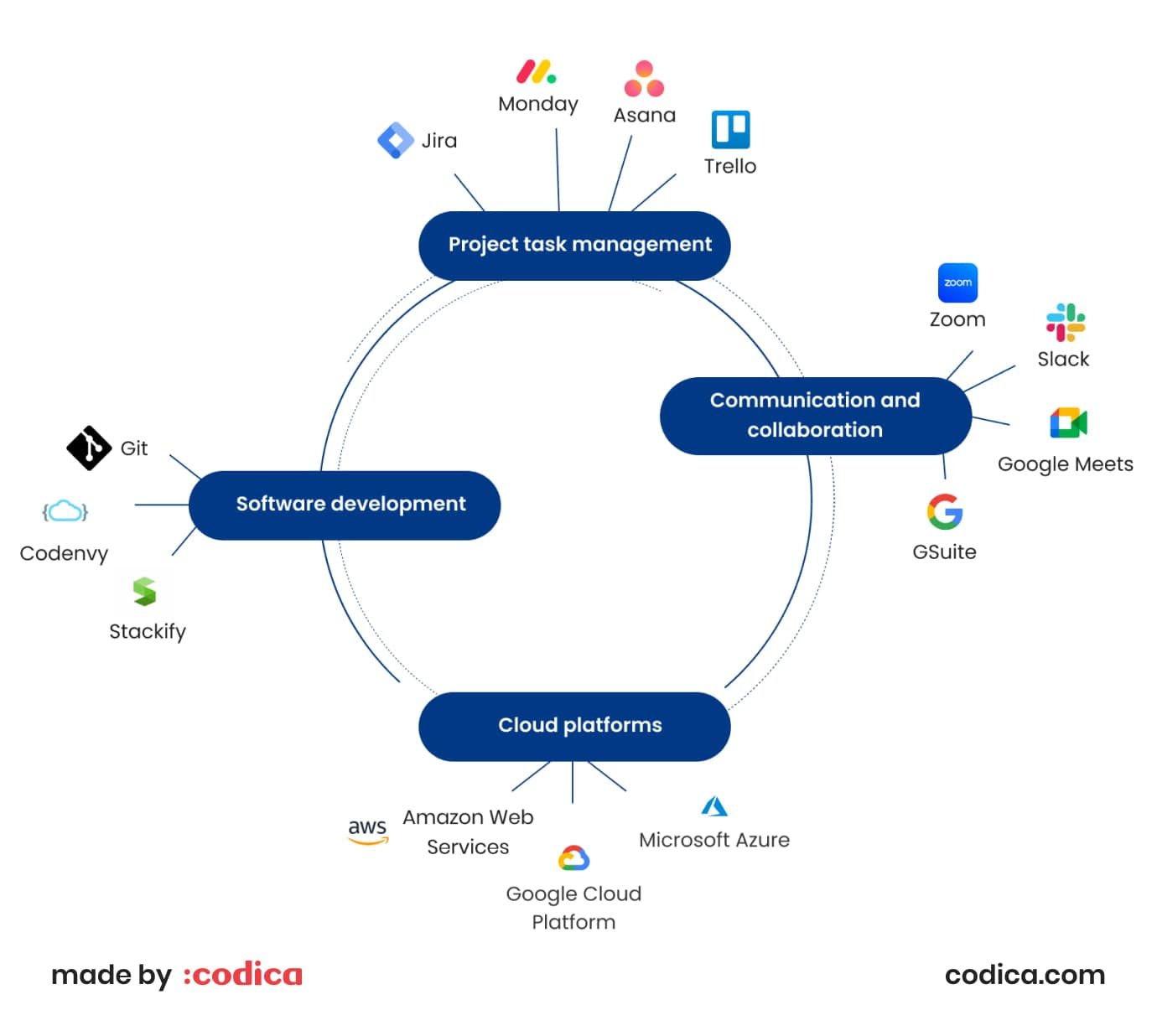
Project task management
- Jira
- Monday
- Asana
- Trello
Communication and collaboration
- Zoom
- Google Meets
- Slack
- GSuite
Cloud platforms
- Amazon Web Services
- Microsoft Azure
- Google Cloud Platform
Software development
- Git
- Codenvy
- Stackify
Read also: How to Choose Best Project Management Tools in 7 Steps
Create a solid business plan
Neglecting planning sets the stage for failure. A meticulously developed business plan serves as a roadmap. It will guide your company toward future endeavors. The plan should adeptly portray your vision, mission, and business model. It also presents a budget and comprehensive market research. Thus, the plan provides a clear path for your business's trajectory.
Prospective angel investors will undoubtedly seek to review your business plan. It serves as a crucial tool for them to comprehend how to start tech startup to generate revenue and achieve scalability. Additionally, investors will scrutinize the presence of an exit strategy to be implemented in the event of significant changes or unforeseen circumstances.
Embrace lifelong learning
Regardless of your background, foster a mindset of continuous learning. An open attitude toward acquiring knowledge forms the bedrock for subsequent progress. Seek wisdom from experienced mentors and draw upon your own experiences. Consider participating in internships, joining other companies, or enrolling in specialized degree programs like technology and entrepreneurship.
Prepare for setbacks
Acknowledge that setbacks are inevitable in the entrepreneurial journey. Develop contingency plans to address different challenges that may arise. You should anticipate worst-case scenarios and explore alternative options.
Initiate a thorough risk analysis to discern conceivable threats and their potential impact on your business. Evaluate the probability of each risk materializing and devise effective mitigation strategies. You should focus on the most substantial risks that may pose challenges to your enterprise.
Analyze your data and be ready to pivot if necessary. Customer analytics tools are crucial for capturing user behavior, measuring retention, and tracking other success metrics. Identifying and fixing potential risks promptly is essential.
Hire an expert team
While hardware and software play significant roles, the ultimate success of your startup hinges on the quality of its people.
Building a highly motivated team with the right skills to develop and launch your product or service is essential.
When seeking co-stakeholders, prioritize tech experts who can contribute to elevating your product. If you are a non-technical founder, consider incorporating tech-savvy individuals into your team. They will complement your skill set. Their contributions will be invaluable in navigating the technical landscape. Thus, you will drive your tech startup forward.
Recommended reading: Codica Named a Top Software Development Company by GoodFirms
Why choose Codica for startup development
In the contemporary business landscape, finding a reliable and competent software development partner has become a challenge.
At Codica, we specialize in providing custom software development services to our global clients. By the way, we maintain the highest standards when it comes to talent hiring.
Whether you need custom development, MVP, PWA, great UI/UX, or a robust mobile app, turn to us. Codica has got you covered. Even if you're a non-technical person, you've come to the right place to collaborate with tech specialists. They will reliably fulfill your requirements.
We are proud of our projects that stand out in different countries' markets. For example, recently, we created a SaaS platform for bakery businesses. It is CakerHQ, the platform operating in Australia.
Lisa, the founder, transitioned from a background in accounting and finance management to the retailing of cake-making products. During this journey, she observed that customers often faced challenges in locating nearby cake makers. This realization inspired the creation of the CakerHQ tech startup, aimed at solving this problem.
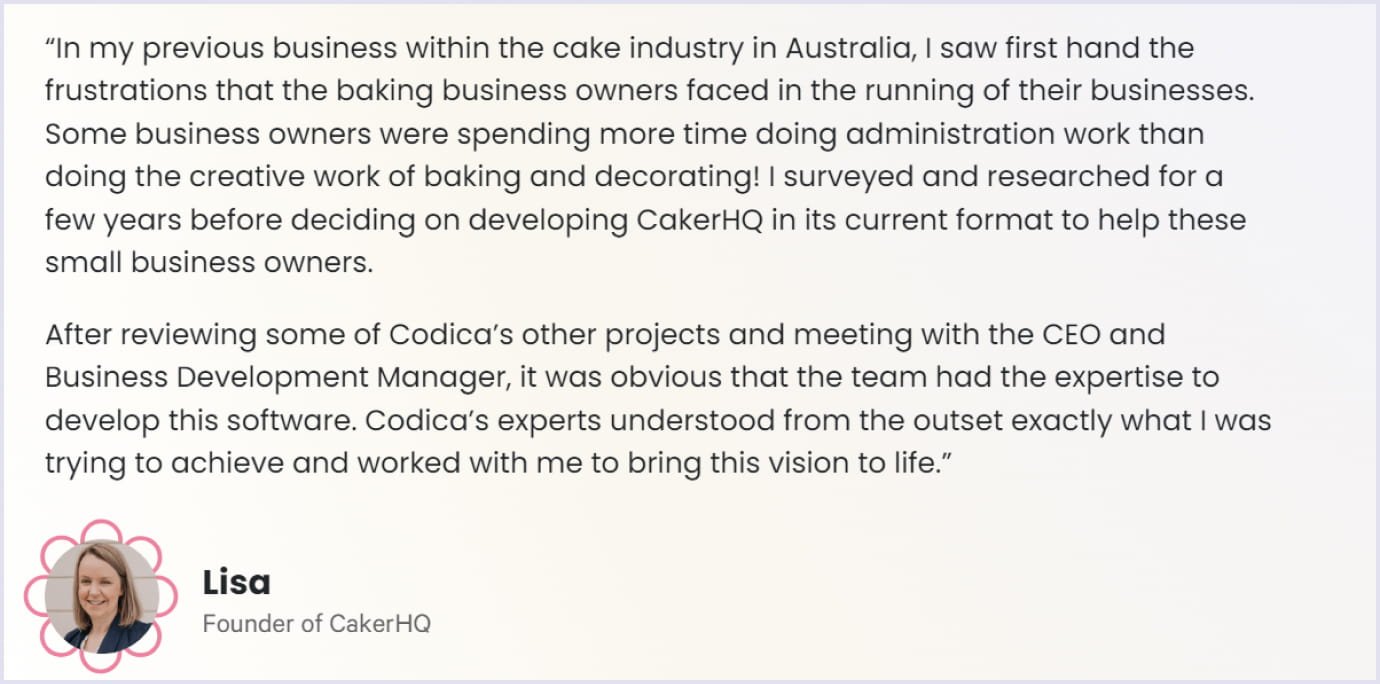
We embarked on developing this website exclusively for bakery businesses, starting from scratch. The outcome was a user-friendly and visually appealing solution. It seamlessly functions on both desktop and mobile devices.
By the way, you can watch a video of how the Caker HQ tech business works live.
Prevention of the main mistakes for a startup launching
During your journey as a tech entrepreneur, it's common to overlook the valuable advice that led you to this point. Sometimes, the journey is going smoothly, and you might be tempted to take shortcuts.
Whether you're in the early stages of research or preparing for your first pitch, these guiding principles will serve you well:
Avoid premature scaling
In the early days, focus on making your product viable rather than getting caught up in the intricacies of scaling. Save the detailed discussions about production, advertising, and growth for later stages.
Always do thorough market research
You may be an expert in your industry, but it's crucial to understand potential investors, too. Confident about your unique product? Ensure there are no legal restrictions limiting its potential.
Seek partnerships
Acknowledge that you can't know everything. Collaborate with specialists in their respective fields to share the startup burden. Engage early adopters to gain valuable feedback and refine your product. Sharing responsibilities reduces the risk of burnout.
Face challenges head-on
While your ideas might be great, don't ignore the difficult aspects. For example, getting people to sign up for your social app requires a thoughtful strategy. Building a medical device with AI involves serious programming and proper AI training. Embrace challenges rather than avoid them.
By heeding these insights, you'll be better equipped to navigate the entrepreneurial landscape. So, you will increase your chances of creating a successful tech startup.
Read also: 10 Biggest Problems for SaaS Companies and How to Solve Them
Bonus: helpful tech startup resources
Want to explore and expand your knowledge? Begin by delving into these diverse resources.

Discover information and connect with investors through platforms like:
- StartEngine
- VentureStorm
- AngelList
- Earlybird
Stay updated on the latest tech news and trends with renowned sources like:
- IEEE Spectrum
- The Verge
- TechCrunch
- Wired
For domains and web hosting services, consider options like:
- Google Domains
- GoDaddy
- Dan
For eye-catching logo designs, check out:
- 99designs
- Canva
These tools can help you with profitable business development that your end users will like.
Conclusion: ready, set, create
The data makes it evident that starting a tech company is far from a simple task. But the fact that around 10% of tech startups survive underscores the value of having a well-thought-out action plan. By following this step-by-step guide, you'll position yourself ahead of the majority of businesses attempting to start a tech startup without a proper strategy.
“If something is holding you back from starting a business, whether that’s a lack of experience, a lack of resources, or both, make the choice to move forward and start your entrepreneurial journey. All you have to do is take the first step. You’ll figure it out along the way,” - Tom Sagi, co-founder and CEO of Hourly.
If you need help implementing your tech solution, contact us. We will analyze your project and bring it to life. Good luck with your entrepreneurial adventure!

